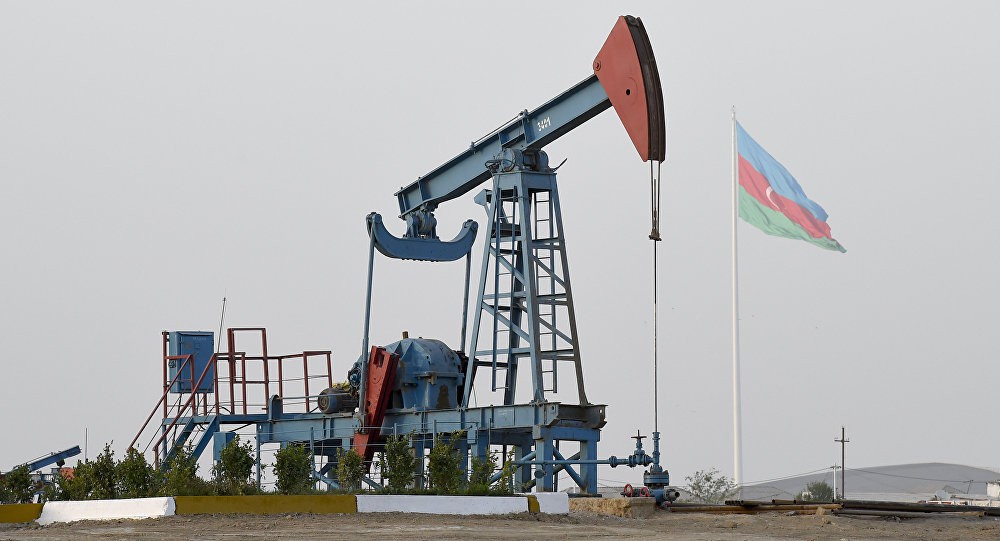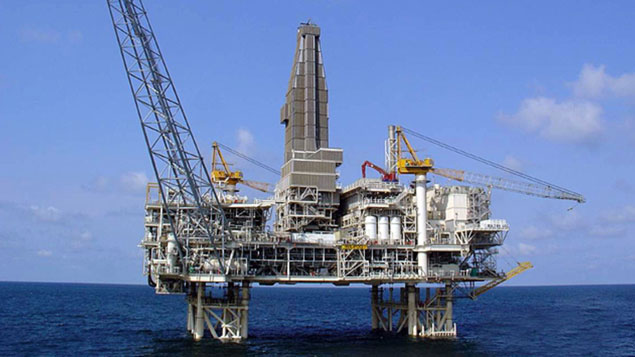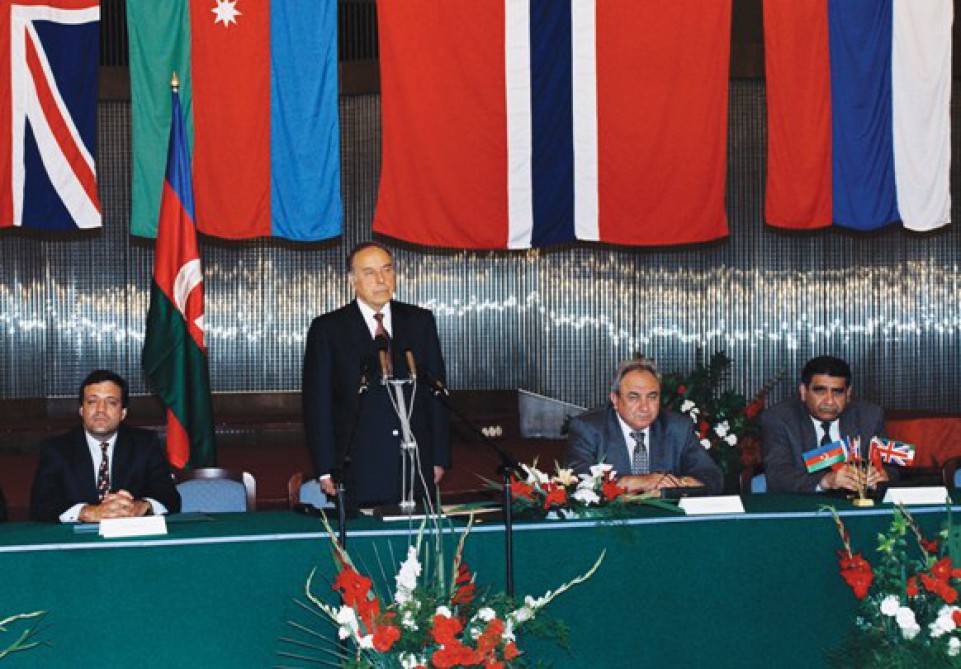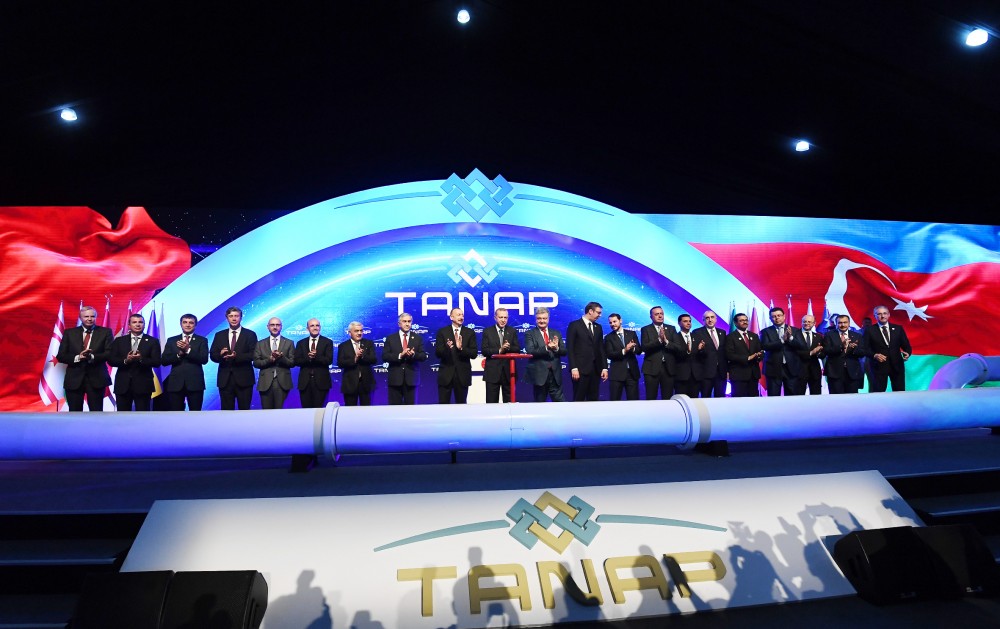AZERBAIJANI OIL
The availability of significant oil and gas
reserves in Azerbaijan is the fortune of our people
and the major factor in the development of the country
for the welfare of the people and their present and future.
Heydar Aliyev

Azerbaijan which is famous as the oil country in the entire world initiated the industrial production of oil in the middle of the 19th century. The oil fountain in the Bibiheybat field of Baku in 1848 laid the foundation for the first industrial production of "the black gold" in Azerbaijan. Azerbaijan took first place in the production and processing of oil in 1899 and accounted for 50% of the global oil production.
Beginning from the 1870s the foreign capital started to flow into the country. The development of the oil industry bred a new generation of local entrepreneurs. Hadjy Zeynalabdin Tagiyev, Musa Naghiyev, Shamsi Asadullayev turned into famous oil entrepreneurs owing to their skills, talent, industriousness, and undertook great work for the welfare of the people and the nation of the country.
Azerbaijan accounted for 75% of the oil produced in the Soviet Union during the Second World War thus providing the front with the fuel made a great contribution to the victory over fascism.
The fountain struck on the Neft Dashlary considered the rare field 100 kilometers away from Baku in 1949 opened a new stage in the production of offshore oil. Azerbaijan started to produce oil in the offshore fields at that time.
The 1970-1980s entered history as the period of great achievements of the Azerbaijani oil industry and the strengthening of its material and technical basis as well as its development. The progress of the said sphere within that period of time is closely connected with Heydar Aliyev who ruled Azerbaijan.

These years were also characterized by the development of the deeper regions of the sea by Azerbaijani oilmen. As the result of the purposeful measures conducted at that time, the oil industry strengthened, and its wide infrastructure was established. Azerbaijan was supplied with different drilling plants for the development of offshore fields, special boats, techniques, and equipment to ensure the offshore construction works, and such strategically important production plant as the plant of the deep sea basis of Baku was established. Moreover, great progress was also observed in the oil processing, petrochemical industry, and oil mechanical engineering.
The rapid arrangement and realization of geological surveys in the Caspian Sea in the early 1970s were also connected with Heydar Aliyev. To date, it is possible to say that the works carried out by the national leader of the Azerbaijani people in all spheres including the oil sector constituted his farsighted plans-`the contract of the century and the intention to improve the living standards and to ensure the independence of the people.
Within the first years of independence, the increase of gas and oil production was regarded as one of the major means for the elimination of economic and social troubles. Under such conditions, the limited financial funds required the participation of foreign companies and investors. Yet, the oil companies of the West hesitated to invest in Azerbaijan due to the Armenians' intervention in Azerbaijan as well as the turmoil, inner differences, and instability. At the same time, the economic interests of Azerbaijan were not ensured by any of the conducted talks.
The talks initiated with the interested foreign oil companies in the 1980s were nearing their end in the spring of 1993. At that period Azerbaijan was close to the signing of a contract that not only neglected the interests of the people but also would strike a hard blow on the economics of the country through plundering the valuable natural reserves of the country.
Heydar Aliyev's return to the government in 1993 by the will and request of the people laid the foundation for the dramatic changes in the political and economic life of Azerbaijan.
The discussions and talks on the oil contract were in fact resumed and at last following the hard process of negotiations, the country agreed on such provisions of the contract that would fully correspond to the interests of Azerbaijan.

The oil contract signed with the oil companies of the West in Gulistan palace of Baku on September 20, 1994, opened a new page in the history of the country. Later, the said contract called the contract of the century was perpetrated in the oil chronicle of independent Azerbaijan
On September 20, 1994, under the leadership of national leader Heydar Aliyev, an agreement on exploration, development, and production sharing was signed with13 oil companies representing eight countries of the world covered three major oil fields in the Azerbaijan sector of the Caspian Sea – Azeri, Chirag and Deepwater portion of the Gunashli field. With this agreement, Azerbaijan started to shine in the world. In the next years, 41 oil companies representing 19 countries of the world signed 32 agreements with Azerbaijan.
In order to ensure the revenues from the joint development of the oil fields and direct them to the economic and social development of the country, The State Oil Fund was established in 1999. Social and economic developments were one of the main aspects of government policy.
After the signing of the `contract of the century, it was quite controversial and difficult to export millions of tons of crude oil to the world market completely safe in terms of economic and political situations. However, thanks to the principal and decisive position of our great leader, Heydar Aliyev, his diplomatic skills and ability to convince the partners, routes of transportation of Azerbaijani oil created. In January 1996, the intergovernmental agreement on transporting Azerbaijani oil via the Baku-Novorossiysk pipeline signed between the Republic of Azerbaijan and the Russian Federation. In October 1997, this line came into use. In 1997, the Azerbaijani and Georgian governments signed an agreement on the transportation of oil into the Black Sea with the Baku-Tbilisi-Supsa route. On April 17, 1999, another important event took place in the history of the country. With the participation of the Presidents of Azerbaijan, Georgia, and Ukraine has inaugurated the Baku-Supsa oil pipeline as well as the Supsa export terminal on the Black Sea coast of Georgia. This line is 850 km long and has an annual output of 5 million tons.
Which country`s territory will be a transition of the main export oil pipeline? It was a controversial issue that could not find its solution. Finally, in November 1999, during the OSCE’s Istanbul meeting, the Presidents of the United States, Turkey, Azerbaijan, Georgia, and Kazakhstan signed an intergovernmental agreement on the construction of the Baku-Tbilisi-Ceyhan Main Export Oil Pipeline.

Construction of the Baku-Tbilisi-Erzurum gas pipeline and the start of the gas production from the Shah Deniz field was a historical event such as the Baku-Tbilisi-Ceyhan oil pipeline. Today, Azerbaijan is a country that not only exports oil but also, exports gas as a logical consequence of this project.
In November 2006, the President of the Republic of Azerbaijan, Mr. Ilham Aliyev, became one of the European Union's closest partners in the field of "Azerbaijan and Security".
Our country started to play a crucial role in the world`s energy market with the launch of the Baku-Tbilisi-Ceyhan oil pipeline and Baku-Tbilisi-Erzurum gas pipeline in 2006 and 2007 respectively.
Exploring the `Umid field` in the gas field in 2010 was one of the most important events in the oil and gas industry in Azerbaijan. Another great achievement was the determination of the reserves in the Absheron field. Absheron field contains probably 350 billion cubic meters of gas. With the discovery of this field, Azerbaijan`s gas reserves reached 2 trillion 550 billion cubic meters.
On the 20th anniversary of the Contract of the Century, the foundation of the Southern Gas Corridor project was laid at the Sangachal terminal in September 2014.
Over the exportation of Azerbaijani gas to the world market, extensive work has been completed. In order to ensure the operation of the Southern Gas Corridor, large-scale development of the Shah Deniz gas condensate field, expansion of the Southern Caucasus Pipeline (SCP), Trans-Anatolian Pipeline (TANAP), and Trans-Adriatic Pipeline (TAP) has been completed.
On the 23rd anniversary of the Contract of the Century, the agreement signed on amendments on the production sharing and development of the Azeri-Chirag-Guneshli block in Baku in September 2017. According to this regulated agreement, the duration of the `Contract of the Century` extended until 2050.
In 2021, the Memorandum of Understanding on joint exploration and development of hydrocarbon resources of the Dostlug (Friendship) field in the Caspian Sea between Azerbaijan and Turkmenistan is a historical event. With this historical event, Azerbaijan will be a transit country. Also. this agreement will contribute to the realization of the Trans-Caspian energy pipeline.
New Oil Strategy`s achievements have become a dynamic economic development of the Azerbaijani state over time. In other words, The new oil strategy achieved its main goal by ensuring the country`s energy security and proportional economic development.



